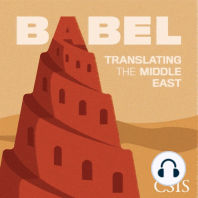29 min listen

China in the Middle East: Part Six
China in the Middle East: Part Six
ratings:
Length:
22 minutes
Released:
Feb 25, 2020
Format:
Podcast episode
Description
In the sixth and final episode of our podcast miniseries, China in the Middle East, Jon Alterman looks at the future of China in the Middle East with Nadège Rolland and Deborah Lehr. They discuss the community of common destiny, political warfare, and opportunities for private company growth in the region. Jon explains why countries roll out the literal red carpet for foreign heads of state, and what that symbolism means for foreign powers acting in the region.
China in the Middle East is a six-part miniseries that is part of our regular series podcast, Babel: Translating the Middle East. We release new episodes every Tuesday.
Deborah Lehr, “Green Financing in Egypt,” Middle East Institute, February 11, 2020.
Deborah Lehr, “How the U.S.-China Tech Wars Will Impact the Developing World,” The Diplomat, February 23, 2019.
Nadège Rolland, “China’s Vision for a New World Order,” The National Bureau of Asian Research, January 27, 2020.
Nadège Rolland, “A Concise Guide to the Belt and Road Initiative,” The National Bureau of Asian Research, April 11, 2019.
China in the Middle East is a six-part miniseries that is part of our regular series podcast, Babel: Translating the Middle East. We release new episodes every Tuesday.
Deborah Lehr, “Green Financing in Egypt,” Middle East Institute, February 11, 2020.
Deborah Lehr, “How the U.S.-China Tech Wars Will Impact the Developing World,” The Diplomat, February 23, 2019.
Nadège Rolland, “China’s Vision for a New World Order,” The National Bureau of Asian Research, January 27, 2020.
Nadège Rolland, “A Concise Guide to the Belt and Road Initiative,” The National Bureau of Asian Research, April 11, 2019.
Released:
Feb 25, 2020
Format:
Podcast episode
Titles in the series (100)
Do Syrian Negotiations Matter?: In this episode, Jon Alterman discusses the prospects for Syria’s political negotiations with Syrian journalist Ibrahim Hamidi. Ibrahim Hamidi is the senior diplomatic editor at Asharq Alawsat newspaper and previously served as the senior political edito by Babel: Translating the Middle East